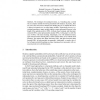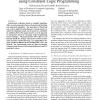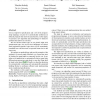101 search results - page 13 / 21 » A Case for Simple SAT Solvers |
CP
2009
Springer
14 years 2 months ago
2009
Springer
Abstract. The global cumulative constraint was proposed for modelling cumulative resources in scheduling problems for finite domain (FD) propagation. Since that time a great deal ...
CP
2007
Springer
14 years 1 months ago
2007
Springer
The techniques for making decisions, i.e., branching, play a central role in complete methods for solving structured CSP instances. In practice, there are cases when SAT solvers be...
APPROX
2004
Springer
14 years 24 days ago
2004
Springer
A simple first moment argument shows that in a randomly chosen k-SAT formula with m clauses over n boolean variables, the fraction of satisfiable clauses is 1−2−k +o(1) as m/...
IFIP
2001
Springer
13 years 12 months ago
2001
Springer
— Semi-formal verification based on symbolic simulation offers a good compromise between formal model checking and numerical simulation. The generation of functional test vector...
OOPSLA
2010
Springer
13 years 5 months ago
2010
Springer
Given a high-level specification and a low-level programming language, our goal is to automatically synthesize an efficient program that meets the specification. In this paper,...



